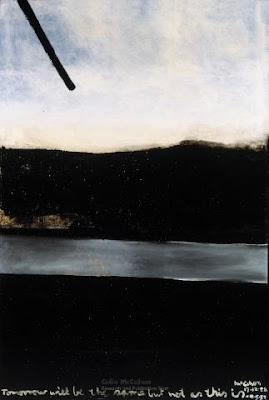Saturday, September 26, 2009
Wednesday, September 23, 2009
I See A Darkness


Guido Reni (17th century), St Sebastian, Oil on canvas, and X-ray of the painting carried out as part of conservation by the Auckland City Art Gallery, NZ
Darkness: "We have considered darkness as a cause of the sublime; and we have all along considered the sublime as depending on some modification of pain or terror: so that if darkness be no way painful or terrible to any, who have not had their minds early tainted with superstitions, it can be no source of the sublime to them. But, with all deference to such an authority, it seems to me, that an association of a more general nature, an association which takes in all mankind, and make darkness terrible; for in utter darkness it is impossible to know in what degree of safety we stand; we are ignorant of the objects that surround us; we may every moment strike against some dangerous obstruction; we may fall down a precipice the first step we take; and if an enemy approach, we know not in what quarter to defend ourselves; in such a case strength is no sure protection; wisdom can only act by guess; the boldest are staggered, and he, who would pray for nothing else towards his defence, is forced to pray for light."
Blackness: "Though the effects of black be painful originally, we must not think they always continue so. Custom reconciles us to everything. After we have been used to the sight of black objects, the terror abates, and the smoothness and glossiness, or some agreeable accident, of bodies so coloured, softens in some measure the horror and sternness of their original nature; yet the nature of their original impression still continues. Black will always have something melancholy in it, because the sensory will always find the change to it from other colours too violent; or if it occupy the whole compass of the sight, it will then be darkness; and what was said of darkness will be applicable here."
Edmund Burke, On the Sublime and Beautiful
Saturday, September 19, 2009
“I feel that there is much to be said for the Celtic belief that the souls of those whom we have lost are held captive in some inferior being, in an animal, in a plant, in some inanimate object, and thus effectively lost to us until the day (which to many never comes) when we happen to pass by a tree or to obtain possession ofthe object which forms their prison. Then they start and tremble, they call us by our name, and as soon aswe have recognised their voice the spell is broken. Delivered by us, they have overcome death and return to share our life.”
Marcel Proust, The Remembrance of Things Past (1913)
Wednesday, September 9, 2009
Oneiric House
The house is a "metaphysical instrument, a mythical tool with which we try to introduce a reflection of eternity into our momentary existence." Juhani Pallasmaa
It's "an instrument with which to confront the cosmos." Gaston Bachelard
"To make their home in the world, that is, to build, human beings must gain more than physical control, they must establish spiritual control. To do so they must wrest order from what at first seems contingent, fleeting, and confusing, transforming chaos into cosmos." Karsten Harries
Saturday, September 5, 2009
Tuesday, September 1, 2009
The Afterlives of Others

Roaming the Theatres of Memory, amidst the Afterlives of Others. Like the elements of the memory theatre which assisted the orators with memorising their speeches, the symbolic traces of the cemetery present small clues to the departed. The mnemonic forensics release only the merest trace. What is the subtext of the draped urn of mourning as opposed to the burning urn of undying friendship?
Shaking hands. A farewell to the mortals or a greeting of god?
The hourglasses, the chains.
Olives, oaks.
Open books and broken columns.
A pillow and a rope.
Cluedo or the Game of Life?
Subscribe to:
Comments (Atom)


 Stanley Kubrick, 2001: A Space Odyssey, 1968
Stanley Kubrick, 2001: A Space Odyssey, 1968





